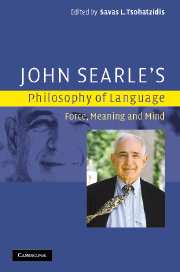Book contents
- Frontmatter
- Contents
- List of contributors
- Acknowledgments
- Introduction
- 1 What is language: some preliminary remarks
- PART I FROM MIND TO MEANING
- 2 Content, mode, and self-reference
- 3 Searle against the world: how can experiences find their objects?
- 4 Seeing what is there
- 5 Intentionalism, descriptivism, and proper names
- 6 On the alleged priority of thought over language
- 7 Rule skepticism: Searle's criticism of Kripke's Wittgenstein
- PART II FROM MEANING TO FORCE
- References
- Index
4 - Seeing what is there
Published online by Cambridge University Press: 08 January 2010
- Frontmatter
- Contents
- List of contributors
- Acknowledgments
- Introduction
- 1 What is language: some preliminary remarks
- PART I FROM MIND TO MEANING
- 2 Content, mode, and self-reference
- 3 Searle against the world: how can experiences find their objects?
- 4 Seeing what is there
- 5 Intentionalism, descriptivism, and proper names
- 6 On the alleged priority of thought over language
- 7 Rule skepticism: Searle's criticism of Kripke's Wittgenstein
- PART II FROM MEANING TO FORCE
- References
- Index
Summary
In Intentionality (1983), John Searle poses one of the most fundamental of questions within philosophy of language: how does language express facts about the world? In particular, how can utterances have meaning, have aboutness, when the expression of such utterances are only sounds and marks that are simply physical phenomena in the world? Searle offers us a long, rich, extensively argued answer. The short crude version of his answer is that utterances have meaning by being derived from the intrinsic and basic intentionality of the mind. Mentality has various forms of intentionality – among them, most importantly, perception and intentional action – and the aboutness of language is rooted on them.
In his theory of intentionality, Searle famously commits himself to internalism, Fregeanism, and realism. Internalism is the thesis that all intentional content is completely “in the head.” The intentional content of all perceptual experiences, beliefs, desires, utterances is constituted exclusively by what is internal to the thinker that has them. A thinker's intentional contents are constituted by both linguistic and nonlinguistic representations. Intentional contents, however, never include the real-world objects, events, locations, or moments “outside” the thinker that the thinker's thoughts are about. Such objects, events, locations, and moments may figure in the truth conditions of the intentional contents, but not in the contents themselves.
Searle's theory of intentionality is also Fregean in spirit. By this I mean that he adopts the central Fregean tenet that all aboutness is secured by virtue of objects “satisfying” or “fitting” intentional contents.
- Type
- Chapter
- Information
- John Searle's Philosophy of LanguageForce, Meaning and Mind, pp. 79 - 101Publisher: Cambridge University PressPrint publication year: 2007



